SAN JUAN CAPISTRANO — Two projects planned in China by The LCW Group, the Cloudland Shopping Complex Phase 1 and Dehua International Art Center, have been singled out for Gold Nugget Merit Awards in the categories of Best International Commercial & Special Use Project and Best International Site Plan, respectively.
The Gold Nugget Awards recognize builders, architects, landscape architects and land planners/developers who improve communities through exceptional concepts in design, planning and development. Award of Merit Winners are the top vote recipients in each category and are the finalists for the Grand Award, which will be presented June 25th at the Gold Nugget Ceremony in San Diego.
Cloudland Shopping Complex Phase I
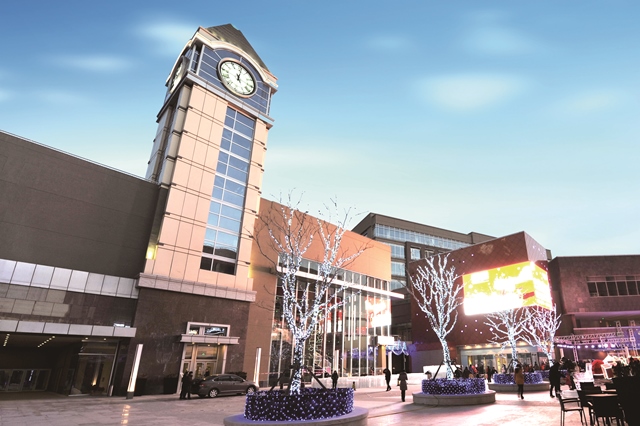
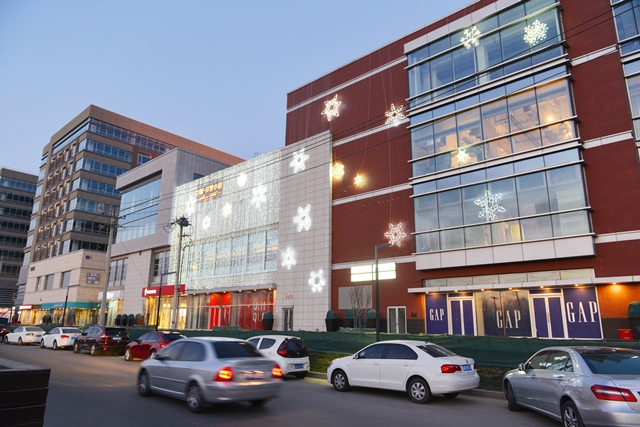
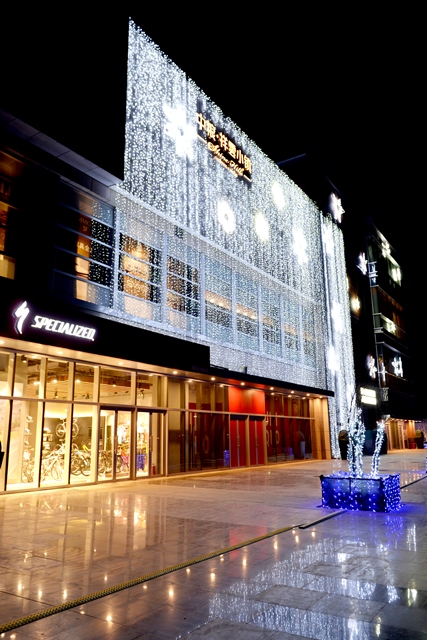
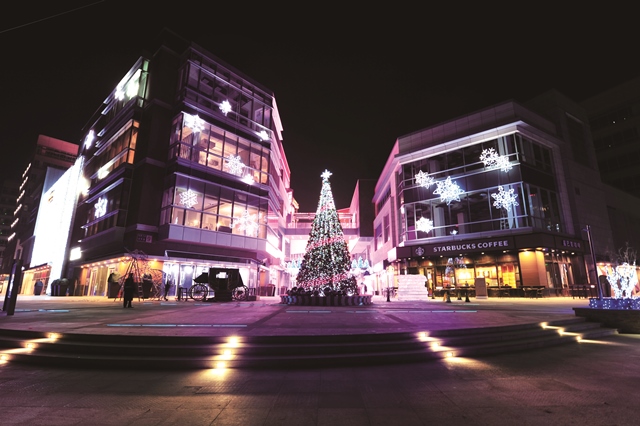
Capistrano-headquartered The LCW Group was the landscape architect for the new Cloudland retail center in Beijing. Cloudland Shopping Complex, the commercial segment of the Cloudland Comprehensive Plan recently opened to the public. The Cloudland Shopping Complex is a development of COFCO Land Holdings Limited, China’s state-owned food processing holding company.
The Cloudland Shopping Complex represents an advancement of the healthy community concept in China, according to Li Wang, president of The LCW Group with offices in Southern California and China. The entire shopping center is an outdoor mall and only major stores, the supermarket and movie theater have direct access from the parking garage. “It may seem common and normal in California, but it’s a very risky and ambition plan for Beijing,” said Wang. “Due to extreme weather conditions, August temperatures can exceed 104 F and January can dip to -4 F. Therefore, people in Beijing are not use to the concept of a modern, open air shopping mall that requires them to walk outside and get some exercise in the process.”
Wang said the landscape design is carrying forward the healthy community mission by inviting shoppers to tour all the shops by foot via outdoor routes. The Cloudland Shopping Complex is a 2.2-million square-foot property and is Beijing’s greatest and most inclusive working, entertaining, and shopping experience. Phase I encompasses 74 anchor stores that establish the retail brand of the complex. Designed by an international group, along with The LCW Group landscape architects, RTKL of Los Angeles is the project architect and signage was designed by Inter Space Time of Tokyo.
Dehua International Art Center
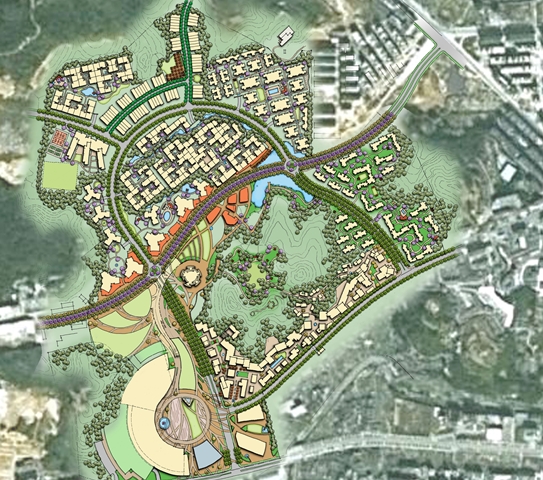
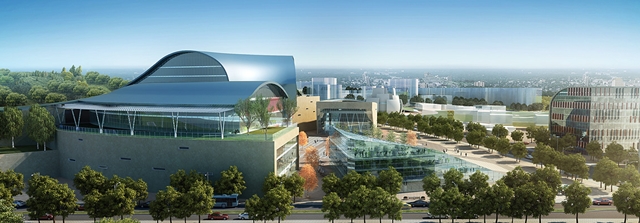
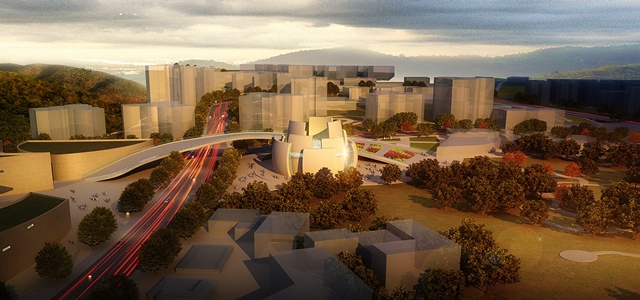
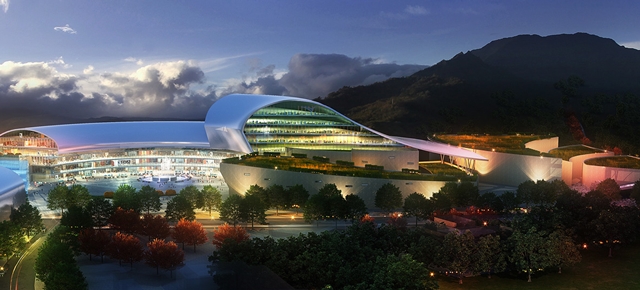
The City of Dehua is renowned for its translucent white porcelain which local artists have used to create devotional figures and sculptures since the Tang Dynasty. The city desperately needs a new convention center and other public facilities, offices, and housing to accommodate industrial scale porcelain production and international trade.
Part of the community planning team, Wang said the major challenge in planning the Dehua International Art Center was satisfying the demands of local residents and artists that any new development connect with reverence and authenticity to the rich history and culture of the city’s ceramic legacy. To this end, the planners created an outdoor market street using the ancient city as a footprint to embrace the history along the main street. All new residential buildings and public structures are screened by a knoll from the main street.
The convention center and museum incorporate elements of porcelain into their design. The elevation of the convention center represents treasure from the earth and is the jewel of the community. The state-of-the art artist village will germinate and foster new art forms, ideas and education to advance endeavors of artists and students as they bring to life galleries, art openings, showrooms, classrooms, and community involvement. A key design element of the Porcelain Museum is the shape of the most famous porcelain Buddha statue. To ensure residents that this new community will provide a better lifestyle, planners use the principle of walkability to connect schools, public open space, markets, major commercial / office zones via pedestrian paths with no vehicular interruptions.

TWO OF THE LCW GROUP’S INTERNATIONAL PROJECTS SELECTED FOR GOLD NUGGET MERIT AWARDS
SAN JUAN CAPISTRANO — Two projects planned in China by The LCW Group, the Cloudland Shopping Complex Phase 1 and Dehua International Art Center, have been singled out for Gold Nugget Merit Awards in the categories of Best International Commercial & Special Use Project and Best International Site Plan, respectively.
The Gold Nugget Awards recognize builders, architects, landscape architects and land planners/developers who improve communities through exceptional concepts in design, planning and development. Award of Merit Winners are the top vote recipients in each category and are the finalists for the Grand Award, which will be presented June 25th at the Gold Nugget Ceremony in San Diego.
Cloudland Shopping Complex Phase I
Capistrano-headquartered The LCW Group was the landscape architect for the new Cloudland retail center in Beijing. Cloudland Shopping Complex, the commercial segment of the Cloudland Comprehensive Plan recently opened to the public. The Cloudland Shopping Complex is a development of COFCO Land Holdings Limited, China’s state-owned food processing holding company.
The Cloudland Shopping Complex represents an advancement of the healthy community concept in China, according to Li Wang, president of The LCW Group with offices in Southern California and China. The entire shopping center is an outdoor mall and only major stores, the supermarket and movie theater have direct access from the parking garage. “It may seem common and normal in California, but it’s a very risky and ambition plan for Beijing,” said Wang. “Due to extreme weather conditions, August temperatures can exceed 104 F and January can dip to -4 F. Therefore, people in Beijing are not use to the concept of a modern, open air shopping mall that requires them to walk outside and get some exercise in the process.”
Wang said the landscape design is carrying forward the healthy community mission by inviting shoppers to tour all the shops by foot via outdoor routes. The Cloudland Shopping Complex is a 2.2-million square-foot property and is Beijing’s greatest and most inclusive working, entertaining, and shopping experience. Phase I encompasses 74 anchor stores that establish the retail brand of the complex. Designed by an international group, along with The LCW Group landscape architects, RTKL of Los Angeles is the project architect and signage was designed by Inter Space Time of Tokyo.
Dehua International Art Center
The City of Dehua is renowned for its translucent white porcelain which local artists have used to create devotional figures and sculptures since the Tang Dynasty. The city desperately needs a new convention center and other public facilities, offices, and housing to accommodate industrial scale porcelain production and international trade.
Part of the community planning team, Wang said the major challenge in planning the Dehua International Art Center was satisfying the demands of local residents and artists that any new development connect with reverence and authenticity to the rich history and culture of the city’s ceramic legacy. To this end, the planners created an outdoor market street using the ancient city as a footprint to embrace the history along the main street. All new residential buildings and public structures are screened by a knoll from the main street.
The convention center and museum incorporate elements of porcelain into their design. The elevation of the convention center represents treasure from the earth and is the jewel of the community. The state-of-the art artist village will germinate and foster new art forms, ideas and education to advance endeavors of artists and students as they bring to life galleries, art openings, showrooms, classrooms, and community involvement. A key design element of the Porcelain Museum is the shape of the most famous porcelain Buddha statue. To ensure residents that this new community will provide a better lifestyle, planners use the principle of walkability to connect schools, public open space, markets, major commercial / office zones via pedestrian paths with no vehicular interruptions.